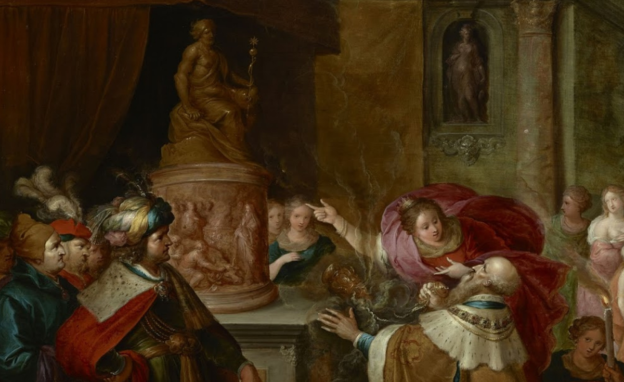There is a Golden Age Fallacy; the idea that there was a time in our past better than now. Partly it is driven by memory (you tend to forget bad events), and partly by confrontation with the evil of the present. For those of us with a conservative bent, the Golden Age Fallacy is a cliff we easily fall off.
Unfortunately there is no such thing as the Good Old Days, as Judges 17-21 quickly makes clear. Stories of life in the time of the Judges, after the stories of the judges themselves, reveal the past is often not better than today. If we want something better, we should look forward to Jesus’ return, not the days of old. That is true of worship, and of morality too.
The first story after the tales of the judges is in Judges 17-18, which focuses on idolatry involving several Israelite tribes. The story begins with an Ephraimite man, Micah, who for some reason stole 1,100 pieces of silver from his mother, then returned it to avoid a curse (vv.1-3).
In response to her son’s fess up, she consecrated 200 pieces to make an idol which was then placed into Micah’s personal shrine with his other deities (vv.4-5). Mimicking the Sinai Covenant’s commands, Micah made priestly garments and ordained his own son to serve as priest (v.5).
“In those days there was no king in Israel. Everyone did what was right in his own eyes” (v.6). Including violating several of the Ten Commandments, and other parts of the Law like ordaining your own personal priest.
Then it gets worse. A Levite who lived in Bethlehem of Judah (not one of the allotted Levitical Cities) migrated and settled with Micah in Ephraim’s hill country (vv.7-8). Micah offered him a job as “a father and priest” in his shrine, which the Levite willingly accepted (vv.9-10), eventually becoming like a son rather than a father figure (v.11).
This Levite was also “ordained” to serve as priest in the shrine (v.12). Micah thought life was great; no curse for stealing mum’s stuff, household gods and priests to serve, even a Levite! God loved Levites, right? Surely providence was smiling on him (v.13).
Then it gets worse. The tribe of Dan, whose inheritance in the south was tricky to conquer, were looking for easier wins and five came to town (vv.1-2). Recognising the Levite’s accent as a fellow southerner, they asked if God would bless their trip and the Levite gave a bland reply (vv.3-6).
The “brave” Danite scouts then came upon a peaceful non-Israelite town with no organised militia, and convinced 600 of their tribe to fall upon the unsuspecting folks and conquer its possessions (vv.7-13).
On their way through, with the 600 troops outside, the five spies stole Micah’s idols from his shrine, along with his valuables and his Levite priest (who was only happy to be promoted from priest to one to priest to a whole tribe; vv.14-20).
Eventually Micah got wind and chased the Danite army with the Neighbourhood Watch, demanding his stuff’s return (vv.21-25). But the Danites were too strong, so Micah went home with nothing (v.26). Idolatry: eventually, you lose everything.
As for the Danites and Levite, they fell on unsuspecting Laish, killing the occupants and renaming it Dan (vv.27-9). It became the northernmost part of Israel. The new occupants set up their own personal shrine which remained until Israel went into Assyrian exile (vv.30-31).
It gets worse. The Levite was named Jonathan, grandson of Moses (v.30). Things were bad in Israel not long after Moses, during the time of Othniel.
Clearly, without a covenant-keeping, covenant-enforcing king, things got bad pretty quick. Idolatry, theft, brutishness, and disobedience were all order of the day.
The past was not a golden time for Israel to look back on. Nor is it for us. This passage reminds us how quickly we can fall into idolatry, if left to our own plans. This theme repeats throughout history; we do not have to look hard even in the “glory days” to see great problems with the Church.
We must carefully watch our worship, and worship in the way God requires. This story is one of syncretism and “personalism”, sinfully adding to what God commanded and worshipping according to personal preference for a local shrine instead of what God commanded.
We must not add to the Gospel. We must not turn it into external religious acts without internal meaning. We must not turn it into our own personal preference and experience over what God requires.
If we do so, we will find our religion empty and meaningless, leaving us with nothing. Because God is not there.
Instead, we must look forward to King Jesus and his return, who is the ruler and substance of our worship. As we follow his lead through his word, we will worship as God requires, not as it was in the good old days when everyone did what was right in their own eyes.

